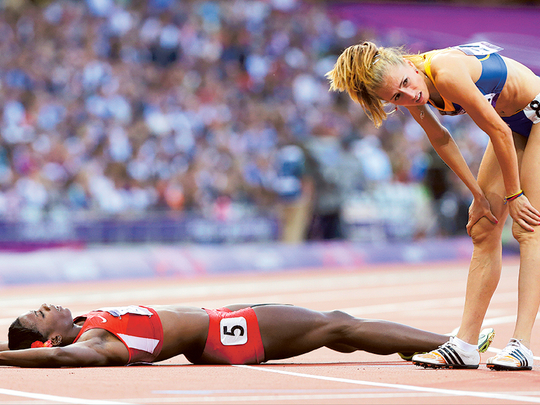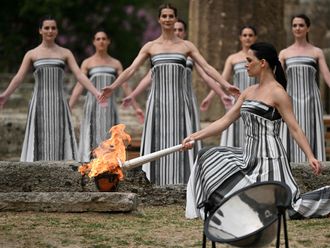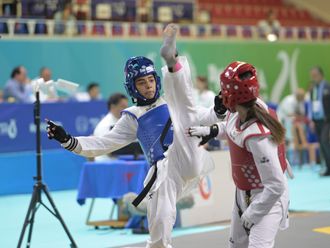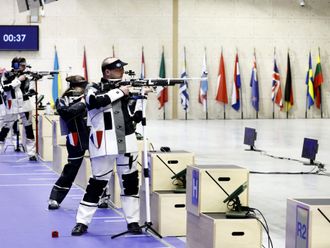
Washington: Before the women’s 800 metres final at the 2012 London Olympics, Alysia Montano crafted a plan based upon the bleak reality of her sport. Her coach, she recalls, told her, “You’re going to have a couple girls who aren’t clean in your race.” On track and field’s largest stage, Montano knew she required a strategy to beat pharmacology as much as athleticism.
“My whole race plan was based on doing what I could to get a headstart to beat the dopers,” Montano said on Monday in a phone conversation. “That’s how I approached it. It’s so sad my race plan had to be like that. It had to be like, ‘Okay, I’m racing against robots. How can I try to get a leg up on them before they start coming after me?’”
The World Anti-Doping Agency released a report on Monday detailing widespread doping and systemic corruption within Russia’s track and field establishment, including bribery of International Association of Athletics Federation (IAAF) officials. The report recommended five Russian athletes receive lifetime bans from competition. Two of them were Mariya Savinova and Ekaterina Poistogova. Savinova won gold in the women’s 800 metres at London; Poistogova took bronze. Montano finished fifth, two places off the medal stand.
The Wada report cast a pall over the entire sport. Perhaps no athlete was more directly impacted than Montano. Remove Savinova and Poistogova, and she is an Olympic medalist. With them in the race, she finished off the podium.
“This is a big, big scandal,” Montano said. “Many people will be affected by it. Specifically, me.”
For three years, Montano carried her fifth-place result with sadness and hurt and pride. Monday morning brought Montano more pain, but also relief that she no longer needed to withhold her true feelings. She knew for years she should have won an Olympic medal. Now she has proof. Now, at least, she can talk about it.
“It’s actually incredibly painful just to think about that moment, those moments lost,” Montano said. “I can’t get that back. Of course I want what’s mine. At the same time, it’s incredibly saddening.”
The report brought Montano a measure of validation, but also a new wave of frustration. She may have a legal fight ahead. She again envisioned herself on the podium, watching the American flag rise, the moment that never happened.
“There’s so much lost,” Montano said. “Not just emotionally, but financially. There’s so much lost. You can’t get that back. It leaves you very, very sad at just these inhumane acts, unethical acts of people. You can’t wrap your head around why or how people could feel good about their efforts, knowing that they did it dishonestly.”
Make no mistake: Montano knew it the whole time. In a sport that rewards incremental improvement, she saw her Russian competition emerge from nowhere. Montano regarded implementing a new core routine that shaved .012 seconds off her time as a major accomplishment. Meantime, she watched Savinova whittle her 800 time from roughly 2 minutes, 2 seconds to 1 minute, 56 seconds in a year.
Montano , 29, also watched the Russians after races and could not comprehend their actions. As she gasped and doubled over, they would smile and high-five and mug for the camera, far from a natural reaction for someone who had been sprinting two straight minutes.
“Our genetic make-up isn’t so drastically different that when you cross the finish line against a pretty intense field that you’re not like, ‘Ugggghh’ — like, gassed by the end of it,” Montano said. “You don’t just put your hands up and jog around and smile like, ‘Wooo!’ It’s not like that.”
As she raced against and lost to the Russians, Montano wanted to vent. She yearned to scream in interviews, “Do you recognise what I’m against?” Without objective proof, Montano held her tongue.
“Another emotion I feel is relief,” Montano said. “You know this is not right, but you can’t say anything. If you say anything without there being hard evidence, then you look sour to people who don’t know the sport. All the people in the sport know this isn’t right. But what I can I do? What can I do except go forward and try to be the honest athlete that I am?”
The frustration wore on her. She confided in her husband and her coach, but never revealed her suspicions publicly. She never considered leaving track, but her experience made her wonder if she should.
“I’ve gone through the roller-coaster ride of, ‘Why am I in this sport?’” Montano said. “How can they reward dirty athletes? It eats at you. You have all these decisions that you’re okay holding off on, and then you recognise, ‘Okay, my results are not just based off me. It’s off of other people’s actions.’
“It’s so difficult emotionally. You start to become more and more unhappy with recognising your efforts don’t mean anything in the sport if they’re going to reward cheaters. I’m not willing to put up with that. You’re like, I feel like I can’t show my support if that’s what it comes down to. I feel like I can’t continue to go after something that may never be mine if that’s what’s allowed in the sport. I’m unwilling to bend. I’m unwilling to be untrue to myself.”
Before the London Olympics, Montano decided that if she medalled, she would put her career on pause and start a family. After she consulted with her husband, they decided her result should have won her a medal, and they had their first child, anyway. In 2014, she famously ran the national outdoor championships while eight months pregnant with her daughter. “Thankfully, I was able to put myself in a mind frame where I was proud of what I did,” Montano said.
— Washington Post











